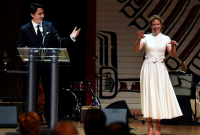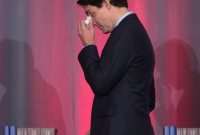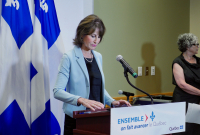Support strong Canadian climate journalism for 2025
Prime Minister Justin Trudeau took an unscheduled dip on Saturday when he fell into the water trying to get into a kayak.
He kept his head above water, but much of the rest of his body was briefly submerged and his left leg was pointed straight upwards while he grabbed hold of the kayak. The spill happened at the shoreline where the water was shallow.
Trudeau, who was wearing a flotation vest, emerged from the spill with a smile on his face. His wife Sophie managed to manoeuvre her kayak without incident.
"I'm just happy the national media was there to capture that," he joked.
The prime minister's kayak voyage at the Gulf Islands National Park Reserve near Victoria became even more eventful when a bride and groom sailed up beside his kayak to pose for a selfie with Trudeau.
Michelle Gruetzner was wearing her white wedding dress.
She said she and her husband, Heiner Gruetzner, were holding their wedding reception on nearby Sidney Spit when they approached the prime minister. Trudeau kissed the bride, twice.
"He said, 'I'm not going to take my shirt off this time,'" said Michelle, referring to Trudeau's shirtless beach side appearance at a wedding ceremony last summer at Tofino, on the Island's west coast.
Michelle said she appreciated the kisses more than a shirtless prime minister.
"It's a nice addition to the photo album," said Heiner.
At a beach side news conference, Trudeau said he's deeply aware of the need to protect Canada's West Coast waters from pollution threats, but also keenly attuned to the benefits of building a strong economy while respecting the environment.
Trudeau's government has approved Kinder Morgan's $7.4 billion Trans Mountain 1,150-kilometre pipeline expansion project from Alberta to B.C.'s coast. The twin pipeline development will greatly increase Canada's oil export capacity but also increases oil tanker traffic along the coast.
"I have been out on these waters all my life, whether it was sailing off of English Bay ... whether it was swimming out here at my aunt's place near Brentwood Bay, and I have been a grandson of B.C. all my life and understand how important it is to protect these waters."
Trudeau travelled to Tofino later Saturday to have meetings with Indigenous and regional leaders, discussing issues including the environment, economy and housing.
Chief Elmer Frank of the Tla-o-qui-aht First Nation said the relationship between his community and the federal government have improved over the last year after a dispute about commercial fishing rights led the chief to say the prime minister was no longer welcome on their territory.
"There's been significant movement. Not significant enough yet for a fisher to go out and make a tangible living, but it was significant enough for us to be able to demonstrate that there is some reconciliation hope," Frank said.
Trudeau acknowledged the progress in working with the First Nation, but said reaching solutions will take time.
"This process of reconciliation and building a future — and I understand your impatience that you wanted to get done overnight what took generations and centuries to go terribly wrong — is going to take more than a few months to get right," he said.
Trudeau spent several days over the past week in B.C., making stops in Revelstoke, Williams Lake, Vancouver and Victoria.
He saw first hand the devastation caused by raging wildfires during his day-long visit to Williams Lake, where more than 10,000 people were forced from their homes to escape the threat of a wildfire.
Trudeau and B.C. Premier John Horgan also took an aerial tour of the fire zone on board a Canadian Forces helicopter. At times the smoke from the surrounding fires was so thick, the ground below was barely visible.
—With files from Andrew Bailey in Tofino, B.C.






Comments